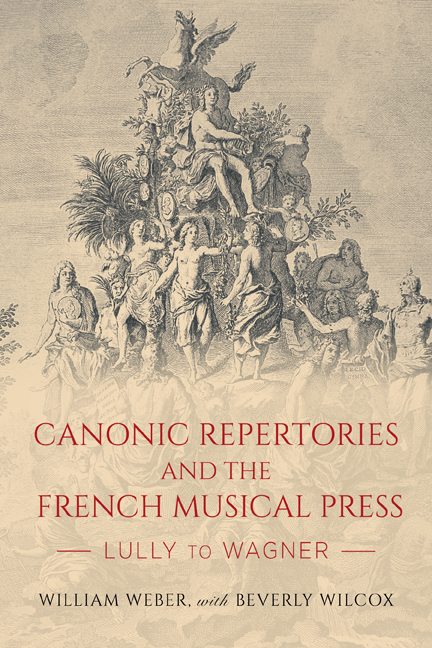Book contents
- Frontmatter
- Contents
- Acknowledgments
- List of Illustrations
- Introduction
- 1 The Domestic versus the Foreign in Eighteenth-Century Paris and London
- 2 Elements of Canon Formation at the Concert Spirituel (Beverly Wilcox)
- 3 To Praise or to Criticize? The Evolution of Music Criticism in Eighteenth-Century France
- 4 Haydn in the Press during the 1780s: How Did a Canon Arise?
- 5 Parallel Canons at the Opéra and the Comédie-Française at the End of the Ancien Régime
- 6 Negotiating Canonic Repertory and les progrès de la musique at the Paris Opéra, 1815–1830
- 7 The Evolution of le vieux répertoire at the Opéra-Comique in the Nineteenth Century
- 8 Richard Wagner, Concert Life, and Musical Canon in Paris, 1860–1914
- An Afterword
- Bibliography
- Index
Introduction
Published online by Cambridge University Press: 26 May 2022
- Frontmatter
- Contents
- Acknowledgments
- List of Illustrations
- Introduction
- 1 The Domestic versus the Foreign in Eighteenth-Century Paris and London
- 2 Elements of Canon Formation at the Concert Spirituel (Beverly Wilcox)
- 3 To Praise or to Criticize? The Evolution of Music Criticism in Eighteenth-Century France
- 4 Haydn in the Press during the 1780s: How Did a Canon Arise?
- 5 Parallel Canons at the Opéra and the Comédie-Française at the End of the Ancien Régime
- 6 Negotiating Canonic Repertory and les progrès de la musique at the Paris Opéra, 1815–1830
- 7 The Evolution of le vieux répertoire at the Opéra-Comique in the Nineteenth Century
- 8 Richard Wagner, Concert Life, and Musical Canon in Paris, 1860–1914
- An Afterword
- Bibliography
- Index
Summary
When and where did it become common for old musical works to remain in performing repertories? What terms were used to define such repertories in either conceptual or historical terms? In which countries did such fun-damental developments in music history occur the most significantly? And what role did the evolving nature of the press play in this history? These queries indicate the central purposes of this book. To answer them I apply certain conceptual tools to analyze how repertories of older music remained in performance and were recognized by the public and by critical opinion as having a special aesthetic status. During the early nineteenth century terms such as “the classics” and “classical music” were used to define the most respected examples of old music. But that vocabulary now seems problematic to scholars because it is so closely linked with a particular area of musical life and indeed with music specific to the nineteenth century. The broadening of scholarly interests beyond “serious” music has led to some fundamental rethinking of the categories used for discussing musical culture from a broad perspective. As Robert Fink suggested over twenty years ago, “classical music canons, performing and avant-garde, have lost their roles as cultural validators; they have lost control over what is defined as ‘art’ music.” That is why scholars in the humanities and social sciences have shifted to the terms “canon” and “canonic” to develop a vocabulary applicable to musical areas as different as chamber music, opera, and popular songs. Even though the term “classics” has been reshaped for discussion of popular music, the concept of canon has proven viable as a neutral analytical vehicle for discussion of music of many kinds.
This concept also points to the changing nature of high reputations, recognizing the multiple kinds of fame which a composer might achieve variously in either the short run or the long run. In Chapter 2 Beverly Wilcox traces the formation of a long-term canonic repertory in the Concert Spirituel, whereby sacred pieces composed in the 1680s were established firmly in the repertory of the Concert Spirituel. Her analysis establishes that French leadership came early in the evolution of musical canons and was recognized on a governmental level to some extent, as did not happen with the Academy of Ancient Music in London, founded in 1726.
- Type
- Chapter
- Information
- Canonic Repertories and the French Musical PressLully to Wagner, pp. 1 - 15Publisher: Boydell & BrewerPrint publication year: 2021



